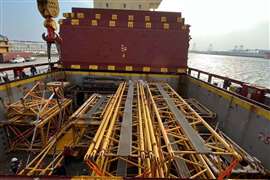Ritchie Bros aims to hold first Chinese auction in 2012
20 October 2011

Ritchie Bros Auctioneers has applied to establish a wholly-owned Chinese subsidiary and hopes to be granted a licence to hold auctions in the country, with the aim of holding its first Chinese auction in the second half of 2012.
Chris Edwards, a long-time Ritchie employee in Asia who has been chief representative in China since 2004, told International Rental News (IRN) that equipment auctions are virtually unheard of in China, but the concept has caught on in other sectors. "Industrial auctions don't exist here and auctions were illegal before 1996. But now China is the largest art auction market in the world and also the biggest wine auction market."
Over the past seven years Ritchie has been educating the Chinese market about the benefits of auctions, and has taken potential buyers and sellers to its auctions in Dubai.
Mr Edwards said current market conditions in China - with a slowdown in new equipment sales and growing inventories of used machines on the books of OEMs and dealers - were conducive to holding auctions. He said auctions would provide manufacturers and dealers with a good way of raising cash and reducing inventories.
"This is what the auction channel does in other markets", he said, speaking to IRN at the BICES exhibition in Beijing, "It provides cash flow, creating bigger markets for owners...We hope that we can create a transparent, open marketplace where sellers and buyers can meet and compete to maximise the value of equipment, like we do in other markets."
If its licence is granted Ritchie Bros hopes to hold its first auction in Beijing and target buyers and sellers within a 1000 km radius of the city.
While the sellers will be OEMs and their dealers in China, the buyers being targeted by Ritchie are the vast number of small owner-operators who typically have fleets of between one and five machines. Many of these privately owned companies cluster on ‘rental streets' in Chinese towns and cities, providing equipment to local contractors.
Although Ritchie sees China as a mainly domestic market, with sellers and buyers sourced in China, it will also bring in international buyers for the first auction. Bringing in machines from outside of China is difficult because the country has strict regulations governing the import of used machines.
Mr Edwards said that during the high-growth years, Chinese manufacturers and their dealers encouraged sales of new equipment by using trade-in deals. With the market now deflated many of these dealers are holding large inventories of difficult-to-sell used machines – in some cases numbering thousands of machines, and often of competitive makes.
"We will take it step by step", Mr Edwards told IRN, "We're targeting [the first auction] as a US$3 to $7 million sale with 300 to 500 machines, and then grow from there. We think the first auction will be important. Once they've seen it, they will understand the value."
Although it is difficult to import used equipment into China, in recent years an exception to this has been the influx annually of around 15000 mainly Japanese excavators into China through a tightly controlled route via Hong Kong and southern China.
This market has reduced more recently, however, as demand for machines has fallen and as domestic suppliers have been able to offer a genuine alternative to used Japanese machines.



